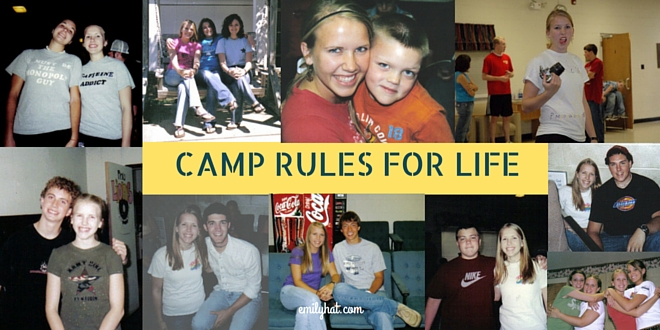Growing up, I attended a congregation that did not go to any huge Christian camps. Instead, our preacher and youth minister took a group of about 100-125 of us to the campus of Freed-Hardeman University where we were able to spend a week with the people that were in our own youth group.
There are so many memories that I could share with you from my years at “Freed Camp”. Every year from the time I was in 3rd grade, that first week in June at Freed Camp was a staple. And looking back, I can still envision the piece of paper that Mr. Tim gave to us regarding the camp rules. After all, we had to know what to/not to pack.
Thinking back, these are the rules that helped shape my life. As a pre-teen, I didn’t understand some of them. As a teenager, I didn’t especially like some of them. But now, as a twenty-something, I respect and appreciate them so, so much.
1: No electronic devices. Period.
We couldn’t even bring portable CD players/mp3 players for the 3 hour bus ride up there! Don’t even ASK to bring some kind of personal gaming device. Nothing was allowed that would promote time alone. The entire week centered around getting to know and getting invested in the people around you. And if you thought that meant only the people you regularly hung out with, you were mistaken. Preteens spent time with teens, annoying boys spent time with girls that had cooties, teenagers spent time talking to the junior counselors and counselors, and everyone had an age-appropriate Bible class that required interaction.
One of the problems I see with young people today is that they aren’t forming relationships within their youth groups. In order to grow and thrive, you need those relationships. You need to form deep, spiritual bonds with people so that they can help you remain faithful during a very difficult time. Plus, forming bonds with people of every age, and even with people with personalities you might not normally want to–you are learning how to function in Christ’s body. As adults, we are very aware that there are certain groups of people we feel more comfortable sitting or conversing with, but as the body of Christ, we are called to all be in fellowship. Learning how to get along at such a young age (when getting along with anyone for an extended period of time is tough) will be such a benefit later in life.
2: No immodest clothing, at all.
No spaghetti straps, no shorts that didn’t go down to your knee, no white t-shirts going to or from the pool, no low-cut shirts, nothing tight, nothing see-through. There are two instances that vividly stick out in my mind in regards to “camp attire”. Every year before camp I would have to go to Old Navy and stock up on boys gym shorts, because they just don’t sell girls shorts that are long enough. But, if you were going to play walleyball or raquetball or basketball or anything else (and you were going to play–group activities were mandatory, even if you weren’t athletic), then you wanted shorts. And, unless you wanted to be sent back to the dorms to change, you had to be wearing something appropriate. The other instance that stands out in my mind was when my preacher called out some teen girls and made them go change their shirts. They were pretty low cut shirts, but they had something under them. Still, he said that it drew attention to them and he was not going to have that. All these years later (probably about 10), I still remember that conversation and I still think about it when I get dressed. How important to have people who will challenge young people to dress in a way that reflects their Savior!
Aren’t these great regulations for all us to continue practicing? I simply won’t wear things that I wouldn’t have been able to get away with at camp. Why? Because if I couldn’t wear them there, and I wouldn’t want for teenagers to wear them now, why would I promote that on my body? Why would I wear something I wouldn’t be comfortable with every single person copying?
3: Spiritual things come first.
Every morning we would get together and have some “wake-up” songs by Lonnie (and you better be on time if you don’t want to be singled out!), then we’d all go to breakfast together, then we would all come back and have a devotional. After the devotional, we would break up into Bible classes that lasted about an hour. After our Bible class, we came back together and had another devotional, and by that time it was time for lunch. Our entire morning was spent praising and learning about God. After lunch, we had group activities that always had a spiritual application thanks to Lonnie. Then, it was time to play sports or do crafts for a couple of hours, then we would go swimming (separately, of course). After swimming we had dinner (and you had better take modest clothing or else you would not be permitted back into the dining room), and after dinner we had about 30 minutes to shower and then be back for yet another devotional. The majority of every day was spent focusing on the spiritual, as it should be.
What a great lesson for life! What percentage of your day is spent focusing on the spiritual? Maybe Sunday’s the majority is spiritual emphasis, but what about Monday through Saturday? How much time are we devoting to prayer? How often do we praise God through song? How many times do we get out our Bibles and study from His word? I know that I can learn a great deal by looking back at the schedule I kept when I was at camp. In my adult life, I definitely need to do better.
4: You do not act silly when you are praising God.
When it was time for devotionals to start, we would have periods of 20 or 30 minutes where we just sang praises to God. During those in between moments when it’s oh so tempting to cut up or laugh or yell out the number that you want…we just couldn’t. Those moments were precious, because we were offering the fruit of our lips to God. It wasn’t a time to joke around or act up. It wasn’t a time to sleep or nod off. It was a time to focus.
I am so thankful that I was taught at such a young age that when it comes to praising God or worshipping Him, it is a time of reverence. In an age where everyone wants to be entertained and “get something out of” worship, what a great thing to acknowledge why you’re there–it’s not for selfish reasons at all.
5: Respect your elders.
This wasn’t a suggestion. If someone older than you came in the room and you had a seat on the couch or in a chair, you got up. If a counselor of any age told you to do something, you did it. There was no such thing as usurping authority, because the threat of making your parents come get you was real (and even happened on occasion).
In the church today, there are countless people who disrespect the elders. Jesus Christ has given authority to specific ones in the church (and it’s His body, so we don’t really get a say on whether we like it). Yet some people bash the elders, completely disregard what they say/ask, and speak ill toward them. I wish I could say, “Respect your elders. This is not a suggestion.” If they show you something in your life that you need to change, change it. Don’t act like the 13-year-old who doesn’t think her shorts are too short and defiantly states she isn’t changing. Have a heart that wants to submit.
There are so many other things that I could tell you that I learned from my time at camp. Instead I will close with two more extremely valuable lessons that I learned:
Spiritual people are more attractive.
Everyone knows that the camp atmosphere produces severe crushes for young people. The thing is, at a camp like the one I went to, no one was really drawn to or attracted to the person who cut up during class or zoned out or was rude. Instead, the boys in the youth group who were the most sought-after were the ones who would lead prayers or songs. The ones who always brought their Bibles and would talk to you after Bible class to share what they’d learned.
Why aren’t more people interested in dating/marrying spiritual people? Why are spiritual people not the most attractive outside of the camp setting? I am so, so thankful that I learned that lesson so many years ago, otherwise I may have been tempted to go to Freed-Hardeman and find a “man” who slept during chapel or skipped all the devotionals or slacked off in Bible class or refused to be a leader at the Henderson 5:45 student-led service.
You have a responsibility to those younger than you.
I can remember being a 3rd through 7th grader and how fun it was to hang out with the “older kids”. I’m sure we were annoying and I’m sure we didn’t add much of anything to their camp experience. But wow, did they make mine that much more enjoyable! I remember hearing Mr. Tim talk about how if the older didn’t invest in the next generation, the youth group would fall apart.
I wish this lesson could be taught to every single member of the Lord’s body. Take responsibility for those younger than you, because they are the future of the church. If you’re 80, teach those that are 60 what they can do to fill your shoes, etc. etc.
What kinds of things did you learn as a child that you are so thankful to have learned?




Melissa Jane
July 21, 2012 at 10:13 pmI wish everyone in every youth group everywhere could read this blog post! It’s so hard to instill this mindset! Can I hug you right now? Haha. I thought we were the only ones that wanted to have those kind of rules and yet, we are losing the battle it seems.